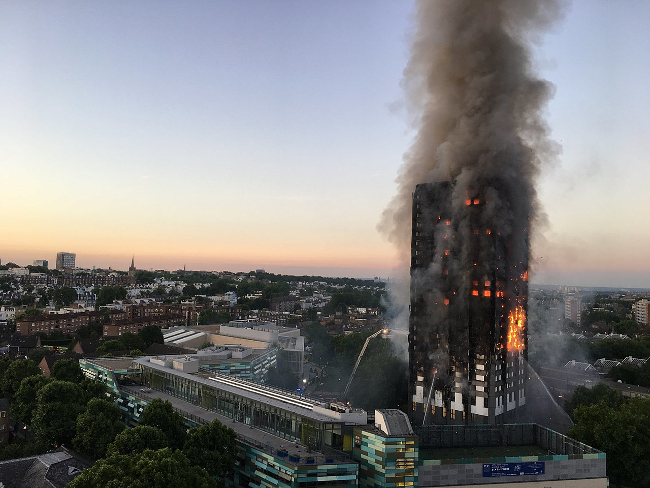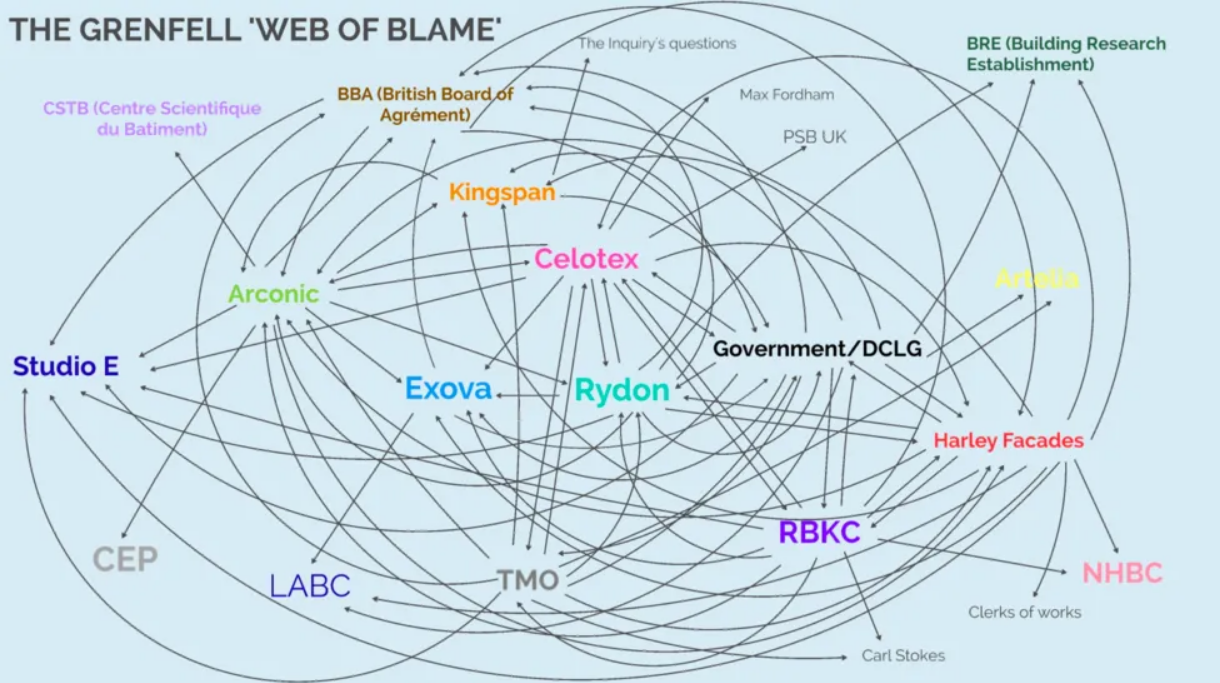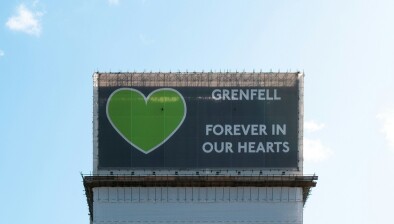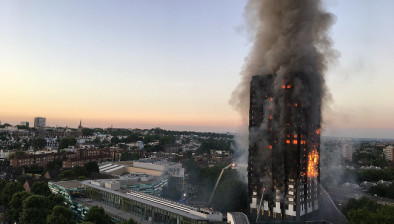Grenfell: Government, organisations and companies ‘all contributed to the disaster’

Image credit: Natalie Oxford
A chain of failures across government, organisations and the private sector led through “incompetence”, “dishonesty” and “greed” all contributed to Grenfell Tower becoming a death trap and resulted in an “unedifying ‘merry-go-round of buck-passing’”, the final report from the Grenfell Tower Inquiry has concluded.
Investigating the circumstances leading up to and surrounding the fire at Grenfell Tower in the early hours of 14 June 2017, which resulted in the deaths of 72 people, The Phase 2 report has highlighted considerable failings in several areas, including cladding manufacturers and insulation works, refurbishment companies, Government’s approach, Local council and housing management and the London Fire Brigade.
The report concludes that the fire was “the culmination of decades of failure by central government and other bodies in positions of responsibility in the construction industry” in relation to the danger of incorporating combustible materials into the external walls of high-rise residential buildings.
It follows the Phase 1 report published on 30 October 2019, which focused on the events of 14 June 2017: how the fire started, how it escaped from the flat where it had begun, and how it spread over the whole building with tragic consequences.
Introducing the report, Inquiry chairman the Rt Hon Sir Martin Moore-Bick explained that the second part of the investigations had taken longer than originally hoped because, as those investigations progressed, the Inquiry uncovered many more matters of concern than had previously been expected.
The Inquiry report finds that the deaths that occurred were all avoidable “and that those who lived in Grenfell Tower were badly failed over a number of years by those who were responsible for ensuring the safety of its occupants.”
Degrees of responsibility
The report’s authors are particularly critical of the companies involved in the refurbishment of the tower and the product manufacturers behind the flammable materials that allowed the fire to spread at speed.
Companies involved in the refurbishment of the Grenfell Tower included Rydon, architect Studio E, fire safety consultant Exova, cladding subcontractor Harley Facades and the Royal Borough of Kensington and Chelsea (RBKC) Building Control.
“They include the government, the Tenant Management Organisation, the Royal Borough of Kensington and Chelsea, those who manufactured and supplied the materials used in the refurbishment, those who certified their suitability for use on high-rise residential buildings, the architect, Studio E, the principal contractor, Rydon Maintenance Ltd, and some of its sub-contractors, in particular, Harley Curtain Wall Ltd and its successor Harley Facades Ltd, some of the consultants, in particular the fire engineer, Exova Warringtonfire Ltd, the local authority’s building control department and the London Fire Brigade,” Sir Martin said.
Sir Martin went on to explain that while not all of them bear the same degree of responsibility for the eventual disaster, “all contributed to it in one way or another, in most cases through incompetence but in some cases through dishonesty and greed”.
The privatisation of the Building Research Establishment (BRE) was also added to the litany of problems. The BRE is a key body in the UK that was set up 100 years ago to help deliver quality science-led standards for the construction industry. It is the government’s expert adviser.
The BRE was privatised in 1997 - but the inquiry said it then became exposed to “unscrupulous product manufacturers.”
The Inquiry concluded that “the dishonest strategies of Arconic and Kingspan” were successful “in a large measure” because of the incompetence and lack of independence of the bodies responsible for product certification, including the British Board of Agrément (BBA), the Local Authority Building Control and the UK Accreditation Service.
It said: “[The BBA’s] failure to adhere robustly to the system of checks it had put in place, and an ingrained willingness to accommodate customers instead of insisting on high standards and adherence to a contract that was intended to maintain them. As a result of systematic shortcomings and inadequate levels of competence and technical expertise among its staff, its scrutiny of the fire performance of K15 and Reynobond 55 E was seriously deficient and the certificates it produced for those products misleading.
“The underlying problem was that the BBA failed to manage the conflict between the need to act as a commercial organisation in order to attract and retain customers and the need to exercise a high degree of rigour and independence in its investigations in order to satisfy those [who] might consider relying on its certificates.”
The report also notes that the National House Building Council, the UK’s largest private Building Control inspector, “failed to ensure that its building control function remained essentially regulatory and free of commercial pressures” and was “unwilling to upset its customers and the wider construction industry by revealing the scale of the use of combustible insulation in the external walls of high-rise buildings, contrary to the statutory guidance”.

Image: Grenfell Tower Inquiry
Recommendations
Panel member and architect Thouria Istephan, who spent nearly 30 years as an architect before joining the Inquiry in 2020, said: “Our report identifies what we think is needed to make sure that the legacy of Grenfell is real and brings about lasting change. Our recommendations place new burdens and responsibilities on people and organisations.”
Ms Istephan continued: “I make no apologies for that: put simply, if you work in the construction industry and you do not feel the weight of the responsibility you have for keeping people safe - you are in the wrong job.”
Former housing association chief executive Ali Akbor OBE, who joined the Inquiry as a Panel Member in 2020, said: “I hope that our report acts as a reminder to the clients of future building projects - including social housing providers - that they have a responsibility to the users of their buildings to ensure that safety is not sacrificed to the demands of speed and cost.”
Mr Akbor concluded: “We cannot in a few words here today do full justice to the totality of our report. What is needed is for those with responsibility for building safety - in my sector as in Thouria’s - to read the report, to reflect on it, and to treat Grenfell as a touchstone in all that they do in the future. To act with professionalism, with competence, and to put people first.”
The Inquiry has made several key recommendations aimed at preventing such a tragedy from recurring, including:
- bringing responsibility for all aspects of fire safety under one government department;
- the appointment of a construction regulator to oversee all aspects of the construction industry;
- the establishment of a body of professional fire engineers, properly regulated and with protected status and the introduction of mandatory fire safety strategies for higher-risk buildings;
- a licensing scheme for contractors wishing to undertake the construction or refurbishment of higher-risk buildings;
- the regulation and mandatory accreditation of fire risk assessors;
- the establishment of a College of Fire and Rescue to provide practical, educational and managerial training to fire and rescue services.
- the introduction of a requirement for the government to maintain a publicly accessible record of recommendations made by select committees, coroners and public inquiries, describing the steps taken in response or its reasons for declining to implement them.
No prosecutions until end of 2026
The Grenfell Tower Inquiry opened on 14 September 2017. During the course of its investigations it disclosed over 300,000 documents to 646 core participants, obtained over 1,500 witness statements and sat for more than 300 days, most of which were devoted to taking evidence from a wide range of factual and expert witnesses.
The Inquiry is entirely separate from the investigation being undertaken by the Metropolitan Police, whose focus is criminal justice.
The Crown Prosecution Service (CPS) said it is still working with the Met but do not expect any charges to be brought until the end of 2026.
Frank Ferguson, head of the CPS Special Crime and Counter Terrorism Division, said: “Our thoughts remain with the bereaved families and the survivors at what must be an extremely difficult time.
“We have been working closely with the Metropolitan Police Service throughout their investigation and will therefore be in a strong position to review the completed evidential file, which they anticipate will be passed to us in 2026.
“Our team of specialist prosecutors will then carefully review the file but do not expect to be in a position to make any charging decisions until the end of 2026.
“Due to the sheer volume of evidence and complexity of the investigation, we will need to take the necessary time to thoroughly evaluate the evidence before providing final charging decisions.”
Responses
Housing minister Paul McLennan said the Scottish Government will take careful consideration of the report’s recommendations.
Mr McLennan said: “The tragic Grenfell Tower fire emphasised how important building and fire safety is. Keeping residents and homeowners safe is our priority and we are taking action to protect lives by ensuring the assessment and remediation of buildings with potentially unsafe cladding.
“We will carefully consider all of the recommendations in the Grenfell Tower Inquiry’s report. (This week) I met with UK Government Ministers to discuss how we can work collaboratively to take the appropriate actions to deliver the Inquiry’s recommendations and ensure residents and homeowners in Scotland are kept safe.
“Scotland already has stringent safety regulations to keep people safe, but we are not complacent. Where immediate action is needed to safeguard people we will ensure appropriate actions are taken to manage risks, pending longer-term remediation works.
“Subject to the devolution of the necessary powers, we will establish a Building Safety Levy in Scotland, equivalent to a Levy that will be introduced by the UK Government in England. The Levy will provide vital revenues to support the funding of our Cladding Remediation Programme.”
Richard Beresford, chief executive of the National Federation of Builders (NFB), said: “The Building Safety Act began the process of ensuring the Grenfell tragedy never happens again, but from cladding and Building Regulation process, to maintenance and fire safety protocol, the Phase 2 report highlights and details many other concerns that could have prevented the fires tragic loss of life.”
Richard Blakeway, Housing Ombudsman, said: “This report will have huge significance for the way housing operates in the future. But it must also act as a moment of reflection for the whole country.
“The survivors and bereaved families who provided such vital evidence throughout the Inquiry should be commended; their voices are clearly heard in this report which is testament to how it has been produced. Everyone at our service is tirelessly committed to fulfilling our role under the Social Housing Regulation Act to deliver change.
“Integral to these findings are respect and trust – and the principles of transparency and accountability. It is clear residents’ complaints were dismissed and devalued.
“Whilst there are technical failings detailed in the report, the gross imbalance of power and dismissal of residents is striking. These are some of the issues we still encounter in our investigations and highlighted in our recent systemic report on attitudes, respect and rights. It identified the need for human-centric provision of services by landlords.
“There is a wider societal change that needs to take place towards those living in social housing, stopping the stigma towards this important tenure. This starts with the investment needed so that landlords can deliver services that meet residents’ needs and are able maintain social homes in a way that is responsible and ensures decency.
“Our work with thousands of residents and landlords has reinforced how the role of a landlord has changed – providing a one size fits all approach to housing and repairs is no longer viable.
“This is evident from the inquiry’s conclusions, with the landlord not fully understanding the needs of the residents they were serving. I see these themes repeatedly in our casework, and remind landlords that complaints hold a mirror up to the quality of service provision and culture of their organisation. Complaints provide landlords with early warning of issues that may be unaddressed, and tackling these can improve relationships and trust between landlord and resident.
“Landlords should rigorously review the complaints they receive to drive learning and create a positive complaint handling culture. Landlords should also ensure they are listening and involving residents in their decision making processes, which was devastatingly absent here.”
The Chartered Institution of Building Services Engineers (CIBSE) said it continues to demonstrate its unwavering commitment to building safety.
CIBSE technical director, Dr Anastasia Mylona, said: “The findings of the Grenfell Inquiry report are both sobering and a stark reminder of the critical need for transparency, integrity and robust regulation within our industry. As the report highlights systemic failures, CIBSE remains committed to driving the necessary reforms in building and fire safety engineering practices. Our role is to ensure that the highest standards are upheld, and that the safety of residents is always the paramount concern in the built environment.”
The Federation of Master Builders (FMB) warned that while the final report has shown the need for competence, there is still a great deal of work to do.
Brain Berry, chief executive of the FMB, said: “While the nation’s local builders are, for the most part, far removed from work that has been investigated as part of the Grenfell Tower Inquiry, it does not mean they are precluded from improving industry standards. Domestic builders do not have minimum competence levels; they are not a protected profession like plumbers or electricians. If industry and government are serious about delivering competence, then introducing minimum standards for entry into domestic building work is a must – this is competence from the ground up.
“The new government needs to turn away from a culture of cutting regulation, which in part has led to poor building safety, and license domestic builders, underpinning the building regime with minimum standards. Why should homeowners not share in the safety net implemented post-Grenfell? Without minimum standards, unregulated or ‘dodgy’ building work will continue, and the industry will not shake off its poor reputation, which is driven by rogue operators plying their trade free from consequence.
“However, where the government has tried to regulate domestic builders, through the Building Safety Act, mostly for work involving building control, they have only outlined high level requirements without any underpinning competence. This has left builders confused and worried about committing to work they feel they may no longer be competent to do. The new government must address this immediately, so industry has clear guidance.”
Gill Hancock, head of technical content at the Association for Project Management (APM), said the publication is a “long-awaited milestone” in the response to the tragic loss of 72 lives.
“APM would like to extend our sympathy to all the families impacted by this tragedy,” Gill added.
“As the chartered membership organisation for the project profession, APM is shocked by the report’s findings and the many examples of bad project management practice applied at Grenfell that contributed to the tragedy.
“The competence framework for managing projects in the built environment, which APM helped to create, is a good step on the journey to ensuring a tragedy like Grenfell never happens again. However, we acknowledge it is only one step. Businesses operating in the built environment sector must recognise the importance of appointing dedicated project experts. Not only that, but they must ensure these people are competent and have the right level of qualifications and training in place.
“Many are doing so already. APM’s goal now is to work with the public and private sector as a whole to ensure this understanding is embedded across industry, so businesses can be confident they are appointing the right people to manage construction projects of all sizes.
“It will take time for the project profession to give careful consideration to the recommendations set out by Sir Martin Moore-Bick in the report and that lessons are learnt. We will continue to work with our members, the wider industry and government to develop appropriate responses and implement the necessary changes.”
Mark Snelling, president of the Association for Project Safety (APS), added: “In the coming days, APS will forensically study the report findings and will then be in a position to make a more detailed assessment.
“What is clear, following this morning’s publication, is that the findings and recommendations contained within this report are of critical importance to the future of the UK built environment.
“The scale of The Grenfell tragedy will profoundly impact the approach to future construction safety and the report reinforces an APS commitment to ensure the safety of those living in our communities is robustly upheld. This is a catalyst for change.”
Peter McGettrick, chairman of the British Safety Council, said: “We welcome the publication of the final report by the Grenfell Tower Inquiry. It is a sobering and comprehensive report which has brought forensic attention to the institutional failings that led to this tragedy, the responsibility for which must be shared across multiple stakeholders.
“Safety must be at the core of any changes, and we need to see an appropriate and proportionate response by all parties, which delivers on the recommendations in the Inquiry’s report and ensures greater clarity, transparency and professionalism at all levels.
“Progress has been made in the past seven years, especially in terms of new legislation and regulation on building safety and social housing, but there is clearly much more to do. The Inquiry’s recommendations build on this and we look forward to the Government’s response and action to deliver on them.”


















